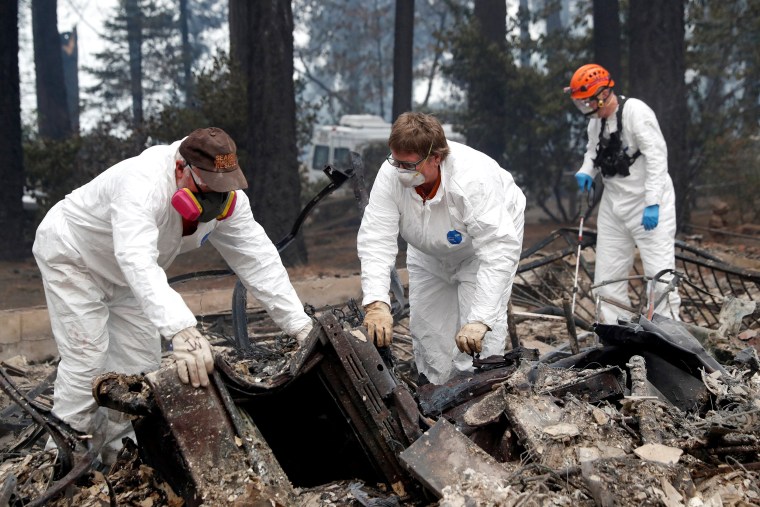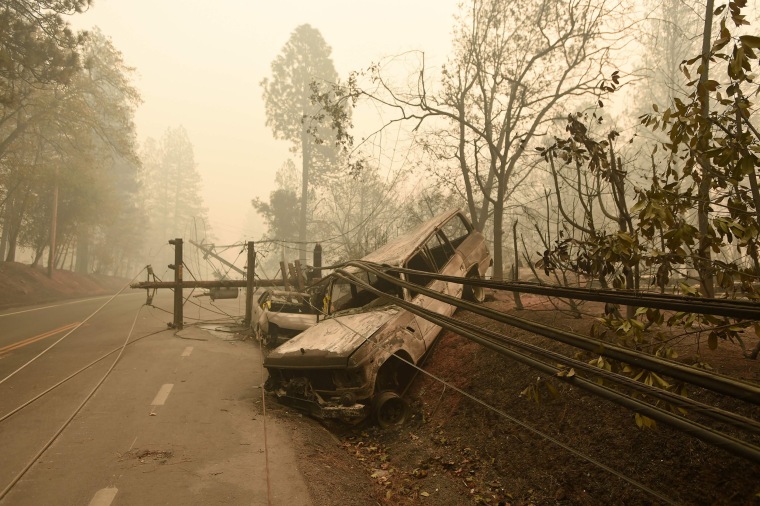The admission by California’s biggest power company that it may be to blame for at least one of the deadly fires ravaging the state sent company stock prices tumbling Wednesday by as much as 30 percent.
Meanwhile, Pacific Gas & Electric on Wednesday was also hit with the first of what's likely to be many lawsuits alleging that the infernos were the result of negligence and that the utility was more interested in boosting profits and salaries than investing in infrastructure.
"PG&E's safety record is an abomination," the suit states.
PG&E stocks were trading at $47.80 a share on Nov. 8, the day that the blazes broke out. The value of utility's shares were about $25 on Wednesday. The stock closed at 25.59, down 21.79 percent at the bell, according to CNBC.
The steep decline on Wall Street came after PG&E admitted in a document filed Tuesday with the Securities and Exchange Commission that its equipment may have sparked the Camp Fire that’s burning in Northern California — and that they might not have enough insurance to cover the expected cost of the damage.
"While the cause of the Camp Fire is still under investigation, if the Utility's equipment is determined to be the cause, the Utility could be subject to significant liability in excess of insurance coverage," the company said in the document, which was obtained by CNBC.
That would "have a material impact on PG&E Corporation's and the Utility's financial condition, results of operations, liquidity, and cash flows."
Not long after that, a trio of law firms who refer to themselves as the Northern California Fire Lawyers filed suit Tuesday in San Francisco County Superior Court alleging that PG&E failed to properly maintain, repair and replace its equipment and that “its inexcusable behavior contributed to the cause of the ‘Camp Fire.'"

"Rather than spend the money it obtains from customers for infrastructure maintenance and safety, PG&E funnels this funding to boost its own corporate profits and compensation," the suit states. "This pattern and practice of favoring profits over having a solid and well-maintained infrastructure that would be safe and dependable for years to come left PG&E vulnerable to an increased risk of a catastrophic event such as the Camp Fire.”
Before that blaze broke out, PG&E warned customers it might turn off power in some areas because of the high risk of igniting a wildfire.
"Despite its own recognition of these impending hazardous conditions, on the day of the Camp Fire's ignition, PG&E ultimately made the decision not to proceed with its plans for a power shutoff," the lawsuit states.
The three major wildfires have claimed at least 59 lives, and 56 of those fatalities were reported at the Camp Fire, officials said. More than 237,000 acres have been consumed by the blazes, and virtually the entire town of Paradise, California, was reduced to ashes.
In anticipation of the expected lawsuits, PG&E has already drawn down $3 billion from its credit line, CNBC reported. But even before the admission, the utility was taking steps to protect itself.
CEO Geisha Williams told stock holders on Nov. 5 that she would once again try to change a state policy called “inverse condemnation,” which holds utilities responsible for any damage done by their equipment even if they have done nothing intentionally wrong.
PG&E is still dealing with 200 or so lawsuits from the deadly 2017 wildfires.
The California Department of Forestry and Fire Protection blamed PG&E equipment for starting at least 16 of those fires, which could cost the utility up to an estimate $15 billion in damages.

